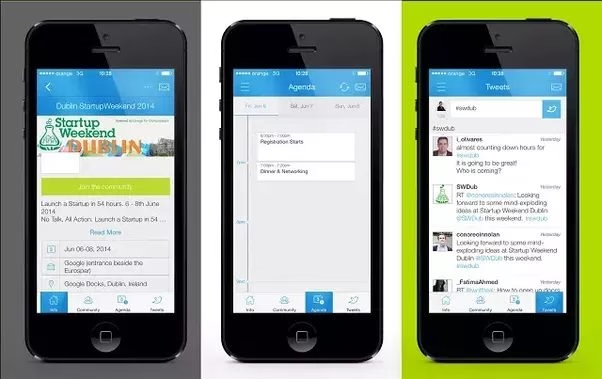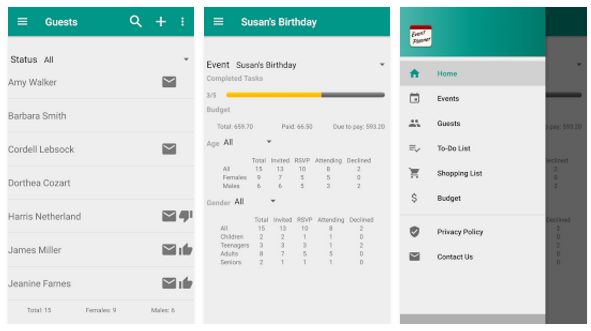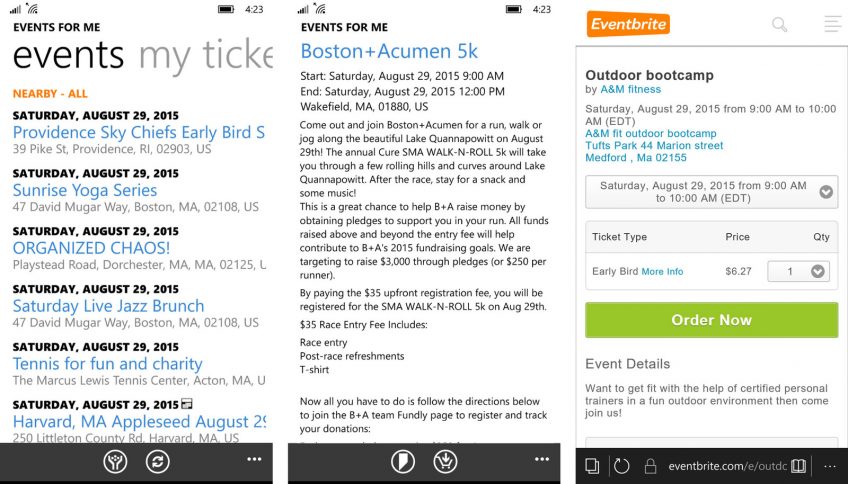
How to Build an Event Planning App?
Interested in building an event planning app? In this article, we will see how you can build an event planning app successfully.
In this article
- Benefits and features of event planning apps
- Examples of event planning apps
- How to make an event planning app without coding
- Custom mobile event planning app development
- Frequently Asked Questions on event planning apps
First, we will discuss some essential features and event planner applications already in the market to get an idea of the users' expectations.
Benefits and features of event planning apps

An event planning app can offer several benefits, e.g.:
- Users can coordinate with various stakeholders using one platform. The larger an event, the more stakeholders are involved. A one-stop platform is advantageous.
- Event planning apps provide granular-level visibility to your event. This helps keep the costs within your budget.
- Top event planning apps provide a comprehensive workflow, therefore, you can remain in control of the entire event lifecycle.
- Large events invariably have a large set of data elements. Event planning apps with their databases can help manage this.
Following are the desired features in an event planning app:
- The app should provide end-to-end coverage of an event lifecycle.
- Users should be able to add custom forms, fields, etc.
- The scheduling feature is very important since it enables one to check real-time availability. Rescheduling can become necessary in some cases, and the app should support it.
- If the event is an online one, then web conferencing becomes important. The app should provide for it.
- Users should be able to handle ticketing using this app.
- Some events require a high degree of engagement from the audience. A live polling feature can help here, therefore, the app should provide that.
Read more about it in “What is event management software? Analysis of features, pricing, types, and benefits”.
Examples of event planning apps
Your event planning app should be competitive in the market, both at the time of the initial launch and in the future. It should have the key features, additionally, an appealing design is needed. I recommend you review the following best party planning apps in the market for that.

Get a complimentary discovery call and a free ballpark estimate for your project
Trusted by 100x of startups and companies like
Eventbrite

Eventbrite covers the entire event lifecycle. It allows users to manage the event end-to-end. The app provides tools to automate registration, badge printing, and reporting.
Social media integration in the app makes marketing easier. Online payments, polling, etc. are some of the other features. The app is available on both Android and iOS.
Cvent
Cvent is a comprehensive solution that caters to multiple use cases providing various event management tools. The features vary by industry and role, additionally, there are features specifically for 3rd-party event planners.
Finding the venue that best suits your requirements, tracking the event planning process, tracking expenses, and calculating the ’Return on Investment‘ (RoI) are some of its‘ features.
Email marketing, badge printing, event registration, online payment, etc. are some of the other features. The “Cvent Event” Android app on ’Google Play‘ can be accessed here. The iOS app can be downloaded from here.
Whova
Whova is positioned as an all-in-one event manageent solution. It is useful for event organizers, event attendees and sponsors. Whova can be used for conferences and community events as well as for trade shows.
The app has a rich array of features. Whova users can check event schedules on their mobile devices without paper programs and create personalized agendas.
Other features include interactive maps, document sharing for handouts and slides, and branding. Their conference app supports live polling, social media integration, announcements, and more.
You can access their Android app and iOS app.
How to make an event planning app without coding
If you are an entrepreneur without access to a skilled mobile app development team, you can still launch your event planning app. Appy Pie provides app builders for various use cases. An event planning app is one such use case.
You can incorporate the following features with the Appy Pie event app builder:
- Reach out to a wider audience.
- Accept payments for tickets in a secure manner.
- Incorporate push notifications to increase user engagement.
- Integrate 3rd-party services like Eventbrite.
- Calendar listings from social media platforms can be integrated with the app.
Sign-up for the Appy Pie app builder. The app builder requires no coding skills, and you can follow a step-by-step intuitive process to build your app.
Note that Appy Pie manages the cloud hosting. Check out their pricing plans, however, remember that only their premium plan allows you to use your own branding.
You need to know the Google Play and Apple App Store publishing guidelines.
Custom mobile event planning app development
While the app-builder approach can be suitable for entrepreneurs in a hurry and without a development team, differentiated features require custom development. I will now explain how to build an event planning app with custom coding.
1,200 top developers
us since 2016
The approach for developing an event planning app
In this custom development track, I recommend the following:
- Design and build the ’User Interface‘ (UI) and the mobile front-end.
- Use ’Software Development Kits‘ (SDKs) or ’Application Programming Interfaces‘ (APIs) for common event planning functions.
- Use a ’Mobile Backend as a Service‘ (MBaaS) provider for the mobile backend management.
- Manage the project as an Agile project, which is suitable for mobile app development, due to its‘ iterative nature. I have earlier explained “How to build an Agile development team”, check it out for more details.
Assemble a team to create a mobile app for events
Your development project needs a team with the following skills:
- Business analysts;
- UI/UX designers;
- Android and iOS developers;
- Testers;
- A Project manager (PM).
The custom development approach requires a competent PM, for example, the PM should know project management best practices. You don‘t need to hire mobile backend developers since I recommend using an MBaaS provider.
UI/UX design considerations
In the competitive landscape of mobile event planning apps, you need to offer unique features as well as an engaging UI. Your UI designers should be well-versed with trendy mobile navigation menu examples.
I had earlier explained how to design the perfect icon for your mobile app, you can consult this guide in your UI design phase. Using the right color schemes is also important, hence, review our guide "8 Trends in Mobile App Color Scheme”.
API options to create an event planning app
I will now take you through a few API options to build an event planning app. This will reduce some of your development efforts since APIs handle quite a few common functions.
Explara APIs: option #1
The next-gen events platform Explara offers a set of event planning and management APIs. You can incorporate the following features with the help of these:
- Ticketing;
- Event management workflow;
- Event registration;
- End-to-end event management;
- Membership management;
- Badge design;
- Event entry management.
Visit their developer portal for more details. The company also offers a mobile app builder.
Grenadine event management APIs: Option #2
Grenadine, a technology platform provider for event management software has its APIs and you can use them in your event planning app. Their APIs let you incorporate the following features into your app:
- Event venue reservations;
- Scheduling of events;
- Calendar booking for events;
- Registering participants;
- Collect registration and participation data.
Key tools for the event planning app development project
This is a full-fledged development project, and you need to execute it effectively. You need appropriate tools for that. I recommend the following tools:
- For test automation, consider using ’TestComplete‘. A mobile app will undergo several changes, and you will use an iterative development process. Test automation is very important in this context.
- You also need a good build and deployment management tool to handle the frequent releases. Consider Jenkins for this purpose, it‘s a reputed tool.
- Finally, you need a good project management tool that‘s suitable for Agile development. I recommend Trello, it‘s a well-known and robust tool. Our guide "The 10 best Agile project management tools” has some recommendations, therefore, you can check it out for more information.
Select an MBaaS provider for the mobile backend
So far, I have mostly concentrated on the mobile app front-end development. You need to address your mobile backend requirements. Developing a mobile backend and the ongoing management of it can take a significant amount of time.
A mobile backend includes several key aspects, which are as follows:
- Infrastructure configuration and management;
- Database provisioning and ongoing management of it;
- Handling persistent storage;
- Ensuring scalability of the app;
- User authentication and management;
- Security for the mobile app;
- Integration with various APIs.
Not surprisingly, managing the above is time-consuming. To gain a quick ’Time to Market‘, I recommend that you engage an MBaaS provider, who will handle all of it. This helps you to focus on your business logic and front-end development.
There are several reputed MBaaS providers like Google Firebase, AWS Mobile, Kinvey, and SashiDo. Our comparison guide “How to choose the best mobile backend as a service (MBaaS)?” can provide you with more information.
The project management approach
I recommend the popular Agile technique called ’Scrum‘. This is well-known for facilitating iterative development. As you might imagine, you will first launch a ’Minimum Viable Product‘ (MVP) of your mobile app, which will enable you to get valuable market feedback.
Depending on the feedback, you will likely need to enhance your event planning mobile app. For example, you might need to add more features. This process goes on in many iterations. In the scrum technique, we call these iterations ’Sprints‘.
A scrum team is a small cross-functional team, i.e., business analysts, designers, developers, and testers work together in one team. The PM performs the role of a ’Scrum master‘. There is also a ’Product owner‘ (PO), who provides the features, i.e., requirements for the project. You should ideally co-locate this small team.
The PO provides the features in a document called the ’Product backlog‘. The scrum team then estimates the features. Depending on the priority and estimation of the features, the team then slots requirements into more than one sprint. The team then takes up each sprint one after the other.
The team conducts a few meetings along the way, as follows:
- A ’Daily stand-up meeting‘ is a status meeting. Everyone reports their status. The scrum master notes down the project issues and resolves them.
- A ’Sprint review meeting‘ takes place at the end of a sprint, where the completed features are demonstrated. The features must be ready for demonstration by this time. The project stakeholders approve the sprint if the features are working.
- A ’Sprint retrospective meeting‘ is a form of a lessons-learned exercise, and the scrum team conducts it after the sprint is over.
I had written about the Scrum technique in “How to build a Scrum development team”, you can get more information from this guide.
The cost to make an event planning app
API providers, MBaaS providers, and the tool providers either publish their price on their website or provide it to you upon request. However, estimating the development of manpower depends on your requirements. The hourly labor rate also depends on geography.
Looking Forward to Developing an Event Planning App?
The market for event management software is growing rapidly. A MarketsandMarkets report estimates that this market will grow from $15.5 billion in 2024 to $34.7 billion in 2029, at a compound annual growth rate (CAGR) of 17.4%.
Within this growing market, event planning apps are becoming ever more important, especially for a professional event planner. 53% of event planners consider themselves comfortable with virtual event tech.
By engaging in an event planning app development project, you are making a viable business decision. With the growing event planning software industry, you can expect a lot of return on your investment quickly.
However, keep in mind that this is an end-to-end development project, therefore, you might need professional help. If you engage a software development company, do so after due diligence.
You can read our guide "How to Find the Best Software Development Company?” to know how you should select a reliable development partner.
If you, as a business owner or CTO, are still looking for experienced mobile developers to partner with for your recent app development project, DevTeam.Space can help you with its expert software developers community.
Write to us your initial mobile app specifications via this quick form and one of our account managers will get back to you with further assistance on partnering with app developers, project planning, management, etc.
Frequently Asked Questions on event planning apps
It is an app that allows users to plan events such as meetups, weddings, etc.
There are a variety of free application creators available online. While they allow people to build free apps, these are not sufficient to be commercially viable to attract mass numbers of users.
If you don't have experience in software development then you should contact a software development company such as DevTeam.Space for help.


